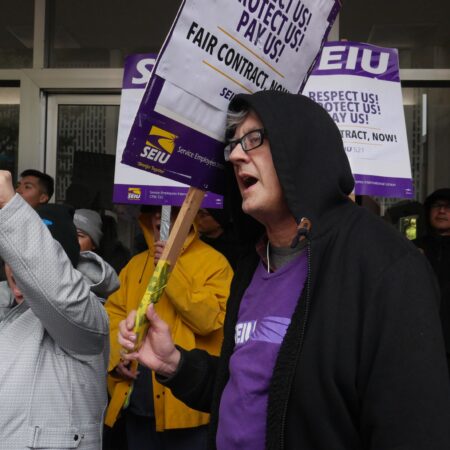
Read more contract enforcement victories >>
In two separate cases, SEIU 521 members successfully overturned disciplinary actions after they exercised their right to respond to the allegations against them.
 Rosalin Remollo is an Environmental Services Aide on the graveyard shift at Natividad Medical Center (NMC). When management alleged that Rosalin failed to complete a specific job assignment, she knew they had gotten their facts wrong. But without any witnesses, it was Rosalin’s word against her manager’s.
Rosalin Remollo is an Environmental Services Aide on the graveyard shift at Natividad Medical Center (NMC). When management alleged that Rosalin failed to complete a specific job assignment, she knew they had gotten their facts wrong. But without any witnesses, it was Rosalin’s word against her manager’s.
“In my 13 years at NMC, I have not had to deal with something like this. Most people don’t realize that we have these rights. I am so thankful for the support from my union and the co-workers on my shift. Because of them, management realized they didn’t have a case and backed down.”
— Rosalin Remollo
Our SEIU 521 Contract Enforcement Department located a nurse who works with Rosalin on the graveyard shift. She confirmed that Rosalin had completed the assignment, as directed, and she signed a written statement in support of Rosalin. After showing this evidence to the Hospital CEO at the Skelly hearing, NMC decided to withdraw its proposal to discipline.
In a similar case at CHISPA Housing Management, Eloisa Sarabia found herself being disciplined for allegations that were not true. Part of Eloisa’s job as a Resident Manager is to keep track of maintenance work orders at the various properties that CHISPA operates. Eloisa was suspended for allegedly not closing out those work orders on time before a state audit.
After our Contract Enforcement Department filed a grievance, we scheduled a meeting with management. The evidence showed there was no way Eloisa could have closed out the work orders on time because she received them only 10 minutes before the end of her shift, and she was not scheduled to work the following day (which just happened to be the day of the audit). Therefore, CHISPA withdrew the discipline due to lack of evidence that Eloisa was solely responsible for not closing out the work orders, and Eloisa received back pay.
Due Process – Public Sector vs. Private Sector
Public sector employees (not on probation) have a right to due process under the 1975 California Supreme Court Skelly v. State Personnel Board decision. The decision requires that public employers give prior notice of their intent to discipline employees, who then have a right to respond to the evidence that the proposed discipline is based on. The meeting where an employee responds to the allegations is commonly referred to as a “Skelly hearing.”
Due process is a little different in the private sector. Employees often do not get an opportunity to respond to allegations until after the discipline is already imposed. Usually we must file a grievance under the union contract, and then schedule a grievance meeting in order to show management that the discipline is unjust.
Whether you work in the public sector or private sector, it is important that you exercise your right to respond to a disciplinary action so that all facts are considered by management.



